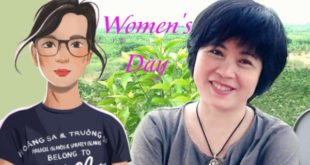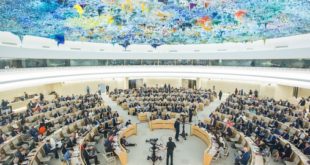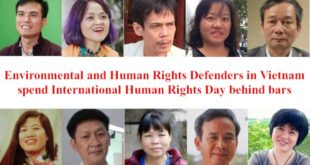 SANTIAGO, CHILE – Addressing the 3rd Ministerial Meeting of the Community of Democracies in Santiago, Chile from 28-30 April 2005, Vo Van Ai, President of the Vietnam Committee for Human Rights and Que Me : Action for Democracy in Vietnam, called on democratic governments around the world “to support a process of democratization in Vietnam”. Governmental delegations from 146 countries, including 44 Foreign Ministers and 40 civil society representatives selected from 196 NGOs in Europe, the USA, Asia, Africa and the Middle East gathered in Santiago for this 3rd Ministerial Meeting of the Community of Democracies under the theme of “Cooperating for Democracy”. The Community of Democracies was founded in Warsaw in 2000 on the initiative of states including Poland, India, Mali, the Czech Republic, Chile, South Korea and the United States to promote democracy worldwide, and held its second gathering in Seoul, South Korea in 2002.
SANTIAGO, CHILE – Addressing the 3rd Ministerial Meeting of the Community of Democracies in Santiago, Chile from 28-30 April 2005, Vo Van Ai, President of the Vietnam Committee for Human Rights and Que Me : Action for Democracy in Vietnam, called on democratic governments around the world “to support a process of democratization in Vietnam”. Governmental delegations from 146 countries, including 44 Foreign Ministers and 40 civil society representatives selected from 196 NGOs in Europe, the USA, Asia, Africa and the Middle East gathered in Santiago for this 3rd Ministerial Meeting of the Community of Democracies under the theme of “Cooperating for Democracy”. The Community of Democracies was founded in Warsaw in 2000 on the initiative of states including Poland, India, Mali, the Czech Republic, Chile, South Korea and the United States to promote democracy worldwide, and held its second gathering in Seoul, South Korea in 2002.
 At the inauguration ceremony, Chilean President Ricardo Lagos Escobar underscored the value of democracy : “Only democracy can bring true progress. There are no dictatorships that have brought progress to their people”. US Secretary of State Condoleeza Rice reflected on her own personal perspective : “Democratization is not an event ; it is a process. It takes many decades to realize the full promise of democratic reform. For nearly a century after the founding of the United States, millions of black Americans like me were still condemned to the status below that of full citizenship. When the founding fathers of America said, “we the people”, they did not mean me…”.
At the inauguration ceremony, Chilean President Ricardo Lagos Escobar underscored the value of democracy : “Only democracy can bring true progress. There are no dictatorships that have brought progress to their people”. US Secretary of State Condoleeza Rice reflected on her own personal perspective : “Democratization is not an event ; it is a process. It takes many decades to realize the full promise of democratic reform. For nearly a century after the founding of the United States, millions of black Americans like me were still condemned to the status below that of full citizenship. When the founding fathers of America said, “we the people”, they did not mean me…”.
Vo Van Ai reminded the assembly that April 30th marked the 30th anniversary of the end of the Vietnam War and the advent of Communism in Vietnam. Below is his Declaration to the 3rd Ministerial Meeting of the Community of Democracies in Santiago on April 30th 2005 :
“Asia is democracy’s greatest challenge. This vast and complex continent, home to more than a quarter of humankind, is a region of booming economies. It contains the world’s oldest democracy, India, but also some of the worst dictatorships and politically closed societies in the world. We have a diversity of great philosophies such as Buddhism, Confucianism, Taoism, Hinduism, Islam – but we are united in a common aspiration for democracy and the respect of human rights.
“The key issue for Asian democracy is China, for a democratic China will impact the whole Asian region and the world. South-East Asia, and notably Vietnam, is also a vital geo-political strategic point. Vietnam, democracy or dictatorship, will play a key role in shaping the region’s future. A future of stability and peace, or one of violence and conflict ? This depends on the commitment of democratic nations today. For democracy is the guarantor of peace, and a democratic Asia is the key to stability and prosperity in the world.
“On this very day, exactly 30 years ago, the Vietnam War came to an end. For one, bright moment, we Vietnamese believed we would at last see peace and freedom in our land. We believed in peace because the Paris Peace Agreement, ratified by 12 countries, pledged reconciliation, concord, and the end of all reprisals. We believed in the support of world democracies to ensure a peaceful democratic transition in Vietnam.
 “But our hopes were crushed on April 30 1975 when North Vietnamese tanks rolled into Saigon. Not only in Vietnam, but in Cambodia and Laos, “Black April” marked the beginning of a brutal era of repression, with the genocide of millions of Cambodians by the Khmer Rouge, and the tragic exodus of Vietnamese Boat People fleeing for freedom on the South China seas. In the years that followed, over 2 million people were thrown into the Vietnamese gulags. Over 65 thousand were executed, and thousands disappeared without trace. The international community abandoned us to fight this new combat alone.
“But our hopes were crushed on April 30 1975 when North Vietnamese tanks rolled into Saigon. Not only in Vietnam, but in Cambodia and Laos, “Black April” marked the beginning of a brutal era of repression, with the genocide of millions of Cambodians by the Khmer Rouge, and the tragic exodus of Vietnamese Boat People fleeing for freedom on the South China seas. In the years that followed, over 2 million people were thrown into the Vietnamese gulags. Over 65 thousand were executed, and thousands disappeared without trace. The international community abandoned us to fight this new combat alone.
“Today, 30 years later, there is still no democracy in Vietnam. No opposition parties, no free trade unions, no free press, no independent NGOs. For the past 30 years, Vietnamese people have been living in a world of the dumb – we are forbidden to speak, and anyone who dares speak out risks immediate arrest.
“Independent religious movements, Vietnam’s only civil society, are stifled and brutally repressed. As I speak to you now, Vietnam’s most prominent Buddhist dissident, Thich Quang Do is detained incommunicado in his monastery simply because he launched an “Appeal for Democracy in Vietnam” with an 8-point transition plan for democratic change. Yesterday, foreign journalists seeking to visit him on this 30th Anniversary were rebuffed by Security Police.
“Cyber-dissidents, and even prominent Communist Party veterans such as General Vo Nguyen Giap, hero of the victory that Hanoi celebrates today, are protesting Vietnam’s lack of progress and reform. In a letter to the Politburo, General Giap deplored the slow pace of Vietnam’s policies which, he said, neglected the “economic development, culture, education, health-care and welfare of the people. In 2020 Vietnam will still be one of the poorest nations in ASEAN, 20 years behind Thailand”. General Giap also denounced the power abuse of the military’s secret services, General Department N° 2, or GD2, a veritable state within the state, which uses torture, intimidation and political assassination to overthrow political factions within the communist party and destabilize top-level cadres.
 “Today, I appeal to all members of the Community of Democracies to support a process of democratization in Vietnam. I urge you to press Vietnam to abolish Article 4 of the Constitution on the mastery of the Communist Party, to allow for political pluralism ; release UBCV Patriarch Thich Huyen Quang, Thich Quang Do and all political and religious prisoners and cease harassment and Police surveillance of dissidents for the peaceful expression of opposition views, e.g. Hoang Minh Chinh, Nguyen Thanh Giang, Tran Khue, Nguyen Dan Que, Hoang Tien, Pham Hong Son, Nguyen Vu Binh, Nguyen Khac Toan etc… ; legalise all banned religions such as the Unified Buddhist Church of Vietnam ; allow the publication of an independent newspaper as a forum for democratic debate. These four concrete measures would be the first steps on the road to democratic reform.
“Today, I appeal to all members of the Community of Democracies to support a process of democratization in Vietnam. I urge you to press Vietnam to abolish Article 4 of the Constitution on the mastery of the Communist Party, to allow for political pluralism ; release UBCV Patriarch Thich Huyen Quang, Thich Quang Do and all political and religious prisoners and cease harassment and Police surveillance of dissidents for the peaceful expression of opposition views, e.g. Hoang Minh Chinh, Nguyen Thanh Giang, Tran Khue, Nguyen Dan Que, Hoang Tien, Pham Hong Son, Nguyen Vu Binh, Nguyen Khac Toan etc… ; legalise all banned religions such as the Unified Buddhist Church of Vietnam ; allow the publication of an independent newspaper as a forum for democratic debate. These four concrete measures would be the first steps on the road to democratic reform.
“People living under dictatorships are pursuing the democratic struggle, but they cannot fight this battle alone. They need the support of the Community of Democracies to help set this process in motion today.”
 Quê Me Quê Me: Action for democracy in Vietnam & Vietnam Committee on Human Rights
Quê Me Quê Me: Action for democracy in Vietnam & Vietnam Committee on Human Rights




